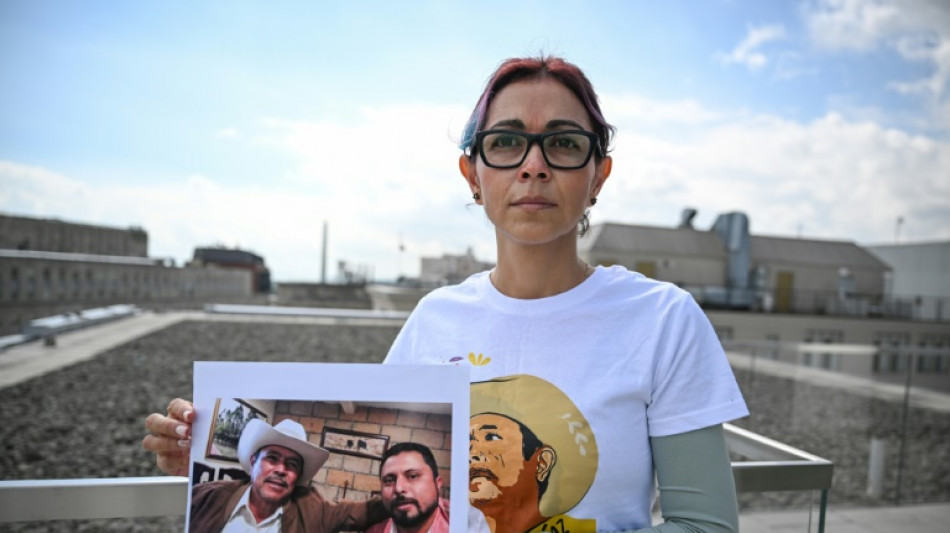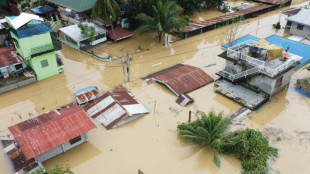

Daughter of missing Mexico environment defender pleads for global help
Brenda Diaz Valencia's life was upended nearly two years ago when the bullet-riddled truck driven by her father, Mexican environmental defender Antonio Diaz Valencia, and lawyer Ricardo Lagunes was found abandoned.
Both men had spent years denouncing what they saw as the catastrophic environmental impacts and inadequate community benefits of a giant open-pit iron mine in San Miguel de Aquila, in Mexico's central Michoacan state.
Now, the 39-year-old Diaz Valencia said she is determined to rally the international community to action.
"I'm here to ask for help, to find the truth, and for them to be returned," she told AFP in Washington, where she was accompanied by Alejandra Gonza, an international human rights lawyer.
"I know that the United States can do a lot and put pressure on the Mexican government to do the impossible to bring them back," she said.
Her father and Lagunes had been fierce critics of the mine's operator, Luxembourg-incorporated steel giant Ternium, which posted global sales of $17.6 billion in 2023 and operates in a region rife with powerful gangs.
The two men were declared missing on January 15, 2023 after attending an anti-mining community meeting, becoming the latest victims in a grim trend of violence targeting environmental and human rights defenders -- and critics of Ternium.
In a statement to AFP, Ternium said it "maintains its deep concern over the disappearance" of the pair, adding that it takes the situation with the "utmost seriousness."
"Ternium rejects any attempt to contextualize violence in Mexico or the regions where it operates to associate our company or its officials directly or indirectly with violent cases such as the above mentioned or the disappearance of any people."
- Protecting forests and people -
Diaz Valencia, a teacher, recalls her father's lifelong commitment to safeguarding the rivers, forests and Indigenous Nahua traditions of San Miguel de Aquila.
Over time, she witnessed the Aquila River, once the lifeblood of the community, run dry as its waters were redirected for iron ore mining, which also led to deforestation for exclusive roads.
"The presence of this mine also fractured the social fabric," she said, describing a profound consequence of the mine's operations.
While Ternium paid royalties to the community, publicizing the recipients sparked extortion by organized crime.
In 2019, as Ternium expanded and increased payments, her father accused a small group, allegedly backed by the company, of claiming leadership roles to misappropriate funds.
He and Lagunes were working to elect new officials, renegotiate royalties and address environmental impacts.
But their activism came at a price: they were shadowed by armed men and repeatedly threatened.
At one community assembly, held in the presence of company representatives, they were warned that if they continued to oppose Ternium, they would be forcibly disappeared.
In a letter to then-president Andres Manuel Lopez Obrador in December 2022, Diaz Valencia accused Ternium of colluding with armed groups to suppress the Aquila community.
A month later, he and Lagunes were gone.
- Critics go missing -
The men's disappearance isn't an isolated case.
A decade ago, three Aquila community representatives who challenged Ternium on financial promises vanished and were later found dead.
Between 2006 and 2023, at least 93 land and environmental defenders went missing across Mexico, with 40 percent still unaccounted for.
In April 2023, the Mexican attorney general's office announced two arrests tied to the activists' disappearance, citing internal Nahua disputes.
A year later, media reports linked the case to the Jalisco New Generation cartel, one of Mexico's most feared criminal organizations.
Gonza, president of Global Rights Advocacy, argues that it is too convenient for the government to blame the disappearances solely on organized crime rather than investigating systemic issues.
"You have to open up at least all lines of investigation," she said, noting organized crime's domination in the area and extremely powerful corporate interests.
She and co-counsel Thomas Antkowiak from Seattle University have filed complaints with the United Nations and the Inter-American Commission on Human Rights.
"It's not only Mexico's responsibility to bring them back," Gonza argued, but of the many wealthy countries connected to Ternium, which can pressure the company to review its Mexican operations.
Brenda Diaz Valencia said her relentless advocacy is driven by the hope that the disappeared are not forgotten — and that one day, she will see her father again.
"I will keep that hope," she said.
B.Peppard--IP




